The best email services
The best email service providers available now, for individuals or businesses
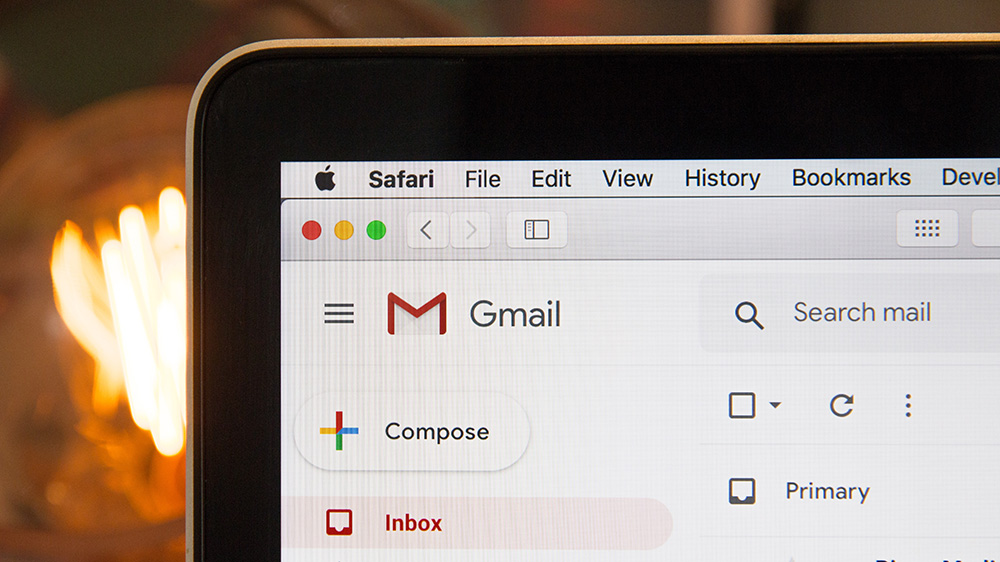
As impressive as the best email services are, you probably don't spend a lot of time wondering if you need to switch your provider. The odds are you've used the same email service for years, without giving a thought to changing things up.
But maybe you should — the best email services stay that way by constantly evolving and adding new features that better suit their users. A new service may be perfect for your email needs, and you wouldn't even know it. And given the amount of time all of us spend sending and receiving emails, devoting a little energy to seeing else out there could pay dividends.
You're not in this alone. We've evaluated a range of leading email services to see which would be best for a variety of different use cases. We examined services both big (Microsoft's Outlook, Google's Gmail) and small (ProtonMail, Zoho). And while our findings are not a one-size-fits-all solution, you may find them useful in pinpointing the best email service for you. So, if you're thinking of making a switch, read on.
Looking for a service to use mainly on your phone? Check out our pick of the best email apps for Android or iOS.
The best email service overall
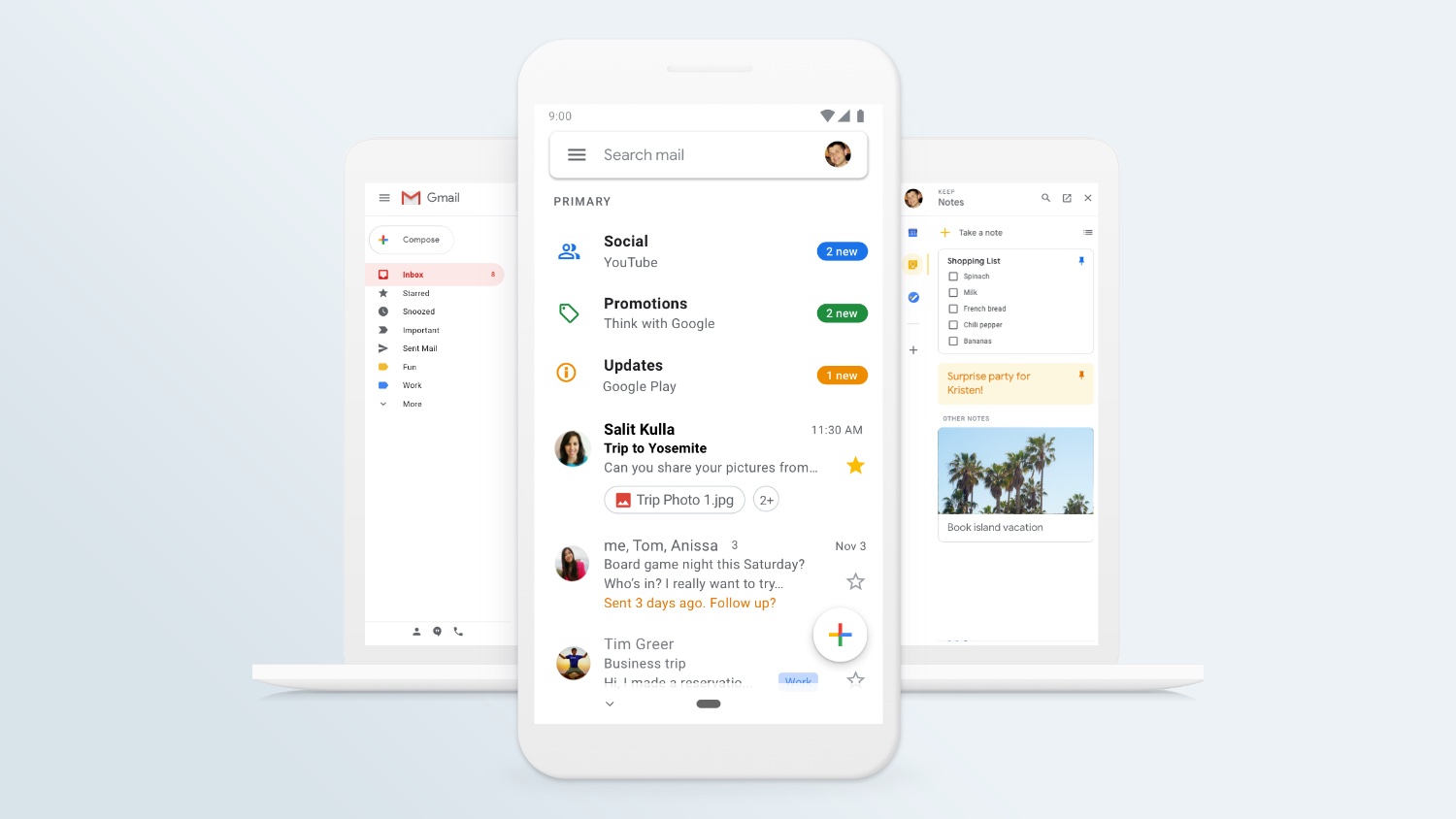
1. Gmail
Reasons to buy
Reasons to avoid
Google's Gmail may not be the top performer in every single metric, but if you're looking for a solution that will work best most of the time, go with Gmail.
Of course, you might not be surprised that Gmail tops our list of the best email services. It is, after all, pretty ubiquitous worldwide. And it’s for good reason: it really does deliver most of what you’re looking for in an email service.
Gmail offers a free version for consumers who want to send and receive email via the company's Gmail domain. It comes with 10GB of free storage in the consumer version, though if you fork over $1.99 per month, you can get 100GB of storage. At $300 a month, you can store up to 30TB of data in Gmail.
This service comes with one of the slickest designs in this roundup, thanks to a streamlined interface that puts your email front and center. Better yet, you can quickly arrange your messages into the Starred category for important stuff and Everything Else for, well, everything else. And thanks to a new feature, you don't even need to open an email to see an attachment. That said, we wish the service would provide a larger window by default for composing messages.
Oddly, Gmail comes with labels instead of folders. Labels work much in the same way as folders, helping you to arrange your content and find it more quickly. But we'd still like to see folders, which help you to arrange your messages more easily and don’t place annoying label tags on messages around your inbox. And although you'll find ancillary services — like Google Docs, Google Sheets and others attached to Gmail — they're far less powerful than Microsoft's equivalents.
If you're a business user, you'll appreciate that Gmail is baked in to Google's G Suite. In addition to all of the features you get in Gmail, you'll also be able to use your own corporate domain for your email address. And with plans as low as $6 per user per month, it's affordable.
Gmail isn't perfect, but for the combination of design, features and value, it can't be beat. That's why it's our best email service overall.
Best email for business
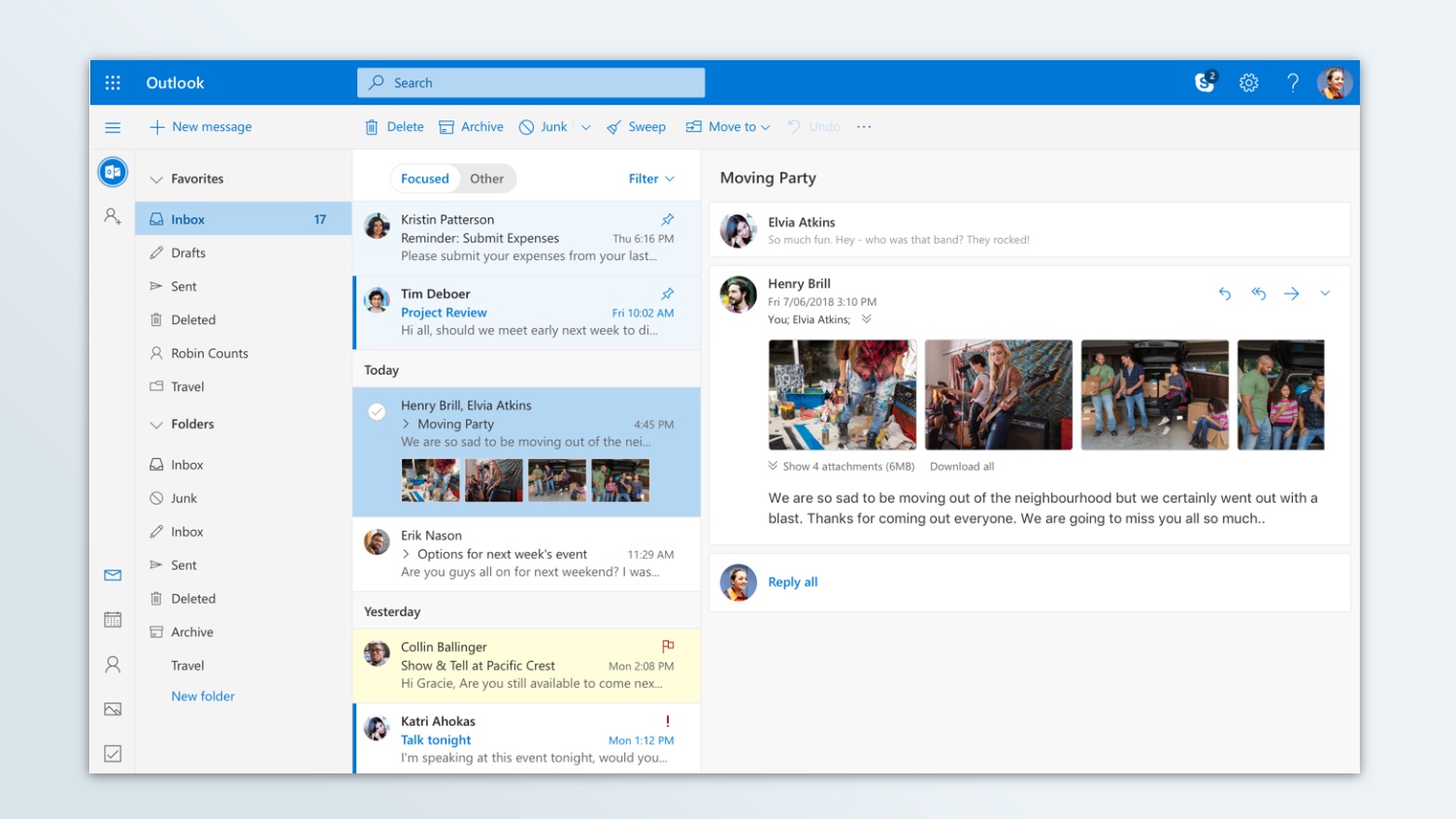
2. Outlook
Reasons to buy
Reasons to avoid
Microsoft's Outlook has been in the email game for a long time. And it's still one of the best email services for anyone seeking a full-featured solution. For companies, it's tops.
In addition to accessing the service in the browser, you can download Office 365 and get Outlook on your Mac or PC. And with help from the company's mobile apps, Microsoft's email services work well on iOS and Android. If you're looking for a service that can work anywhere and everywhere in much the same way, Outlook is your winner.
Arguably, Outlook's best attribute is its power. The sheer number of options and features at your disposal can be dizzying. And whether you want to set auto-replies, manage a slew of folders or manage your email more productively, Outlook can handle the task with ease.
Because Outlook is so popular, many third-party extension makers offer add-ons that expand the service's functionality. And with help from some of the best spam filtering in this business, you'll find that Microsoft's service does a fine job of protecting you against malicious threats.
But Outlook falls short in its design. Due in large part to the sheer number of features it has, Outlook can be cumbersome to use, and its design difficult to navigate. And although it's a great business service, if you want to use something for basic emailing, Outlook might not be the best choice.
Top for security and privacy
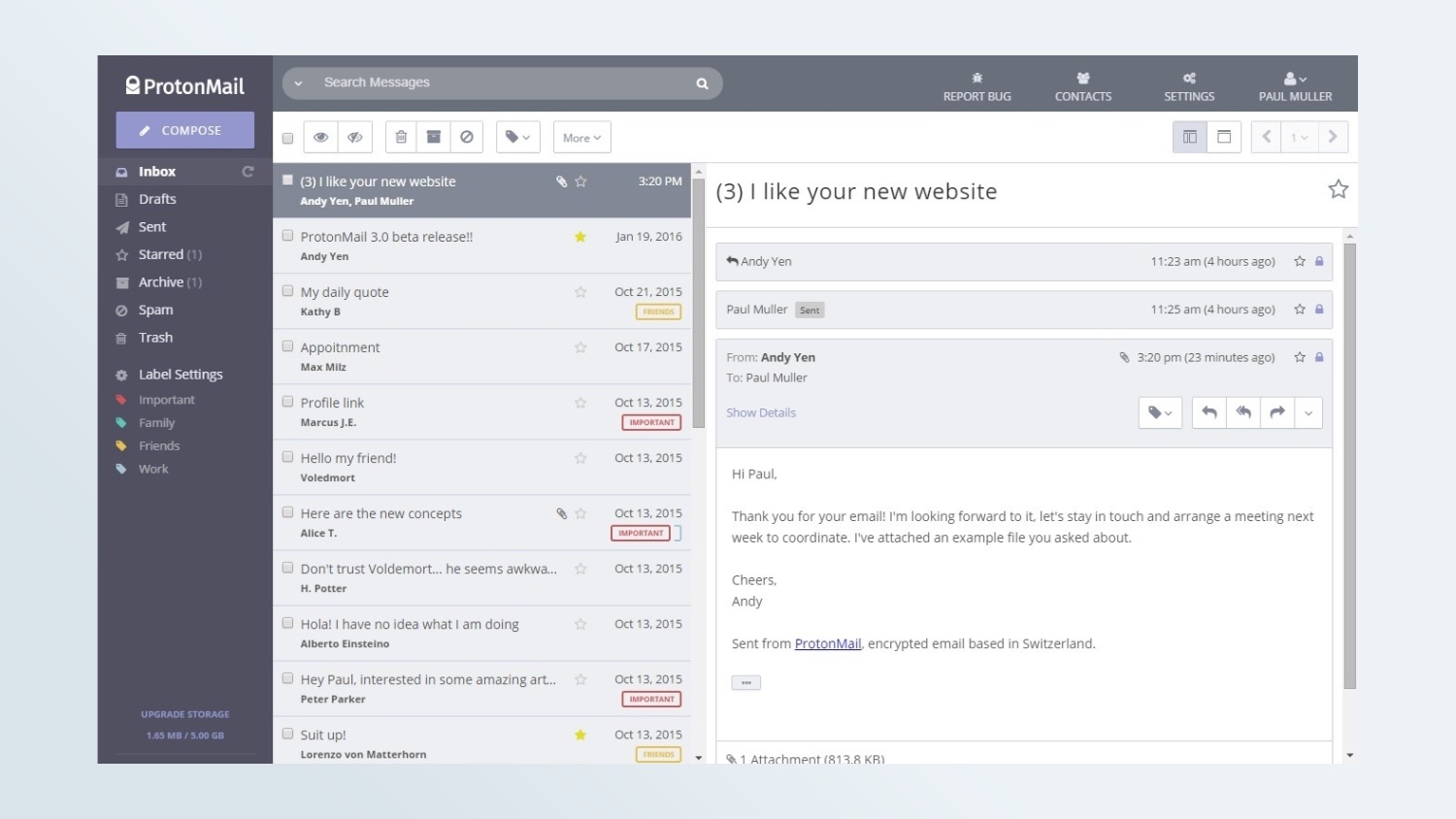
3. ProtonMail
Reasons to buy
Reasons to avoid
If you haven't heard of ProtonMail, that's likely because it's far less popular than Gmail, Outlook or even Yahoo Mail. But if you're a privacy advocate or simply care about security, ProtonMail the best email service for you.
This free download places security at the center of the experience. All ProtonMail messages are encrypted from one end to the other, ensuring that no third parties can access your messages. Better yet, you don't need to create your ProtonMail account with any personally identifiable information, so you can make a truly anonymous account.
Open-source advocates will be happy to hear that the service truly conforms to that standard and is always free. (However, you can upgrade to a paid account to get more storage and the option to create corporate email addresses.)
In its design, ProtonMail is a little behind the competition. Its look and feel is rather basic, and it may take some getting used to before you feel right at home. Gmail users will still likely face less of a learning curve than Outlook users.
Since the whole idea of ProtonMail is security, you can't easily port your current email address from another service to this one, because messages would ostensibly flow through those servers and therefore limit your security. You can, however, have messages sent to ProtonMail from any account.
ProtonMail comes with business support at a cost of $5 per user per month to start. However, it lacks many of the bells and whistles you get in Gmail and Outlook, which may make ProtonMail less appealing to corporate users.
Best for ease of use
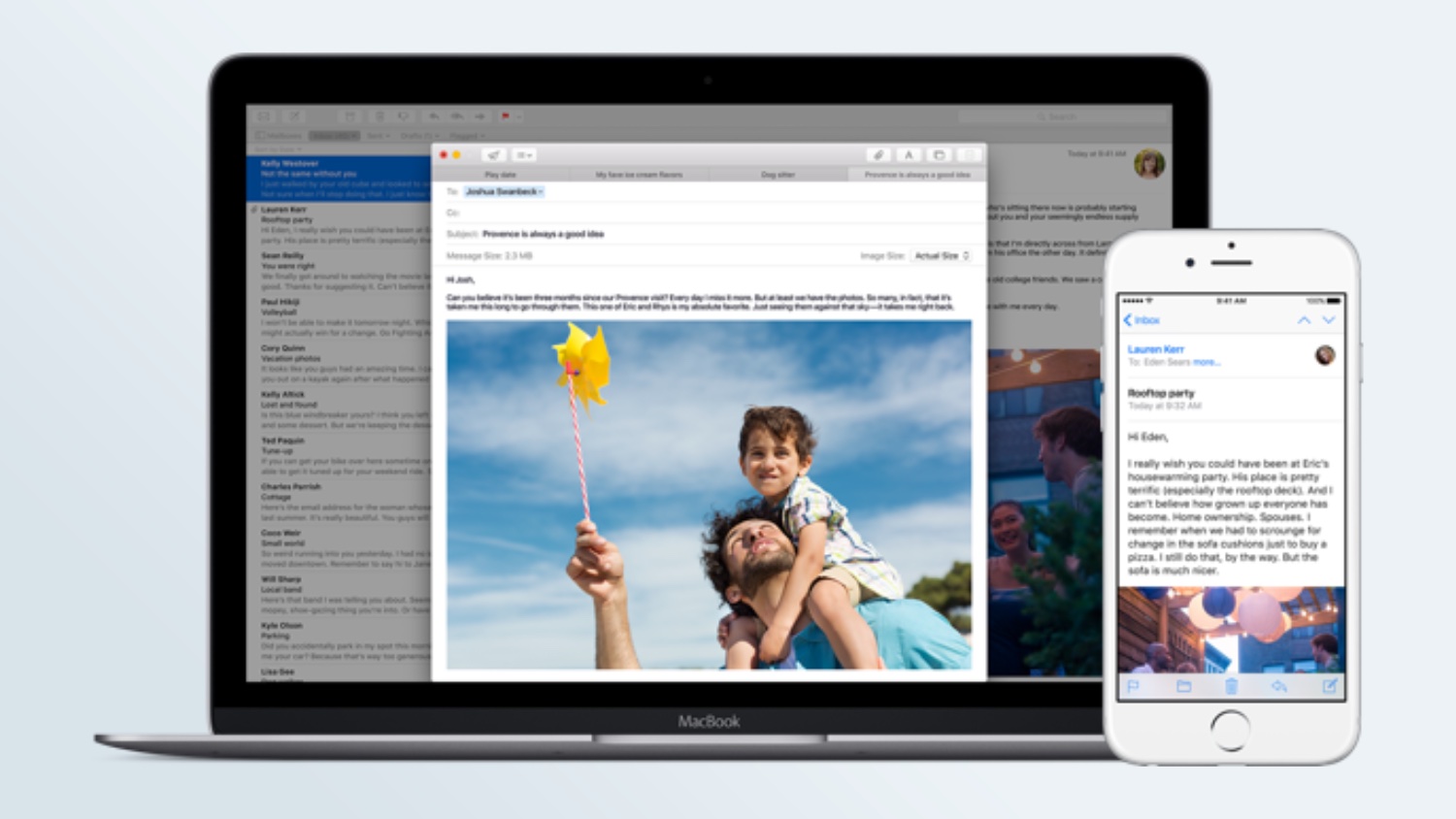
4. Apple Mail
Reasons to buy
Reasons to avoid
If there's anything you should know about Apple Mail, it's that this service won't deliver the best performance or the best looks in this roundup. It will, however, be simplest for novices to use.
Apple Mail comes baked in to Apple's iOS and macOS operating systems. That can be both a good and bad thing. On the good side, if you're an Apple addict who uses only Mail, you can rest assured that your messages will be synced across your devices with no major interaction from you.
On the other hand, if you want to use Mail on other platforms, like Windows or Android, you're out of luck. In other words, if you're not an Apple addict, move on.
When you start using Apple Mail, you'll likely appreciate how simple and nicely designed it is. The app makes it easy to find messages and place them in folders for safekeeping. And if you receive plenty of spam emails, you'll be impressed by how well Mail filters those messages to keep your inbox (nearly) free from junk mail.
However, if you're a business user hoping to get more from your messages, Apple Mail isn't for you, for a few reasons. For example, you can't set out-of-office messages without creating cumbersome rules. And, like it or not, you won't find the option to upgrade Mail to add more features.
Apple Mail isn't for everyone. But if you're an Apple user who wants a simple, native app to use, it's a fine choice.
Good for multiple email accounts
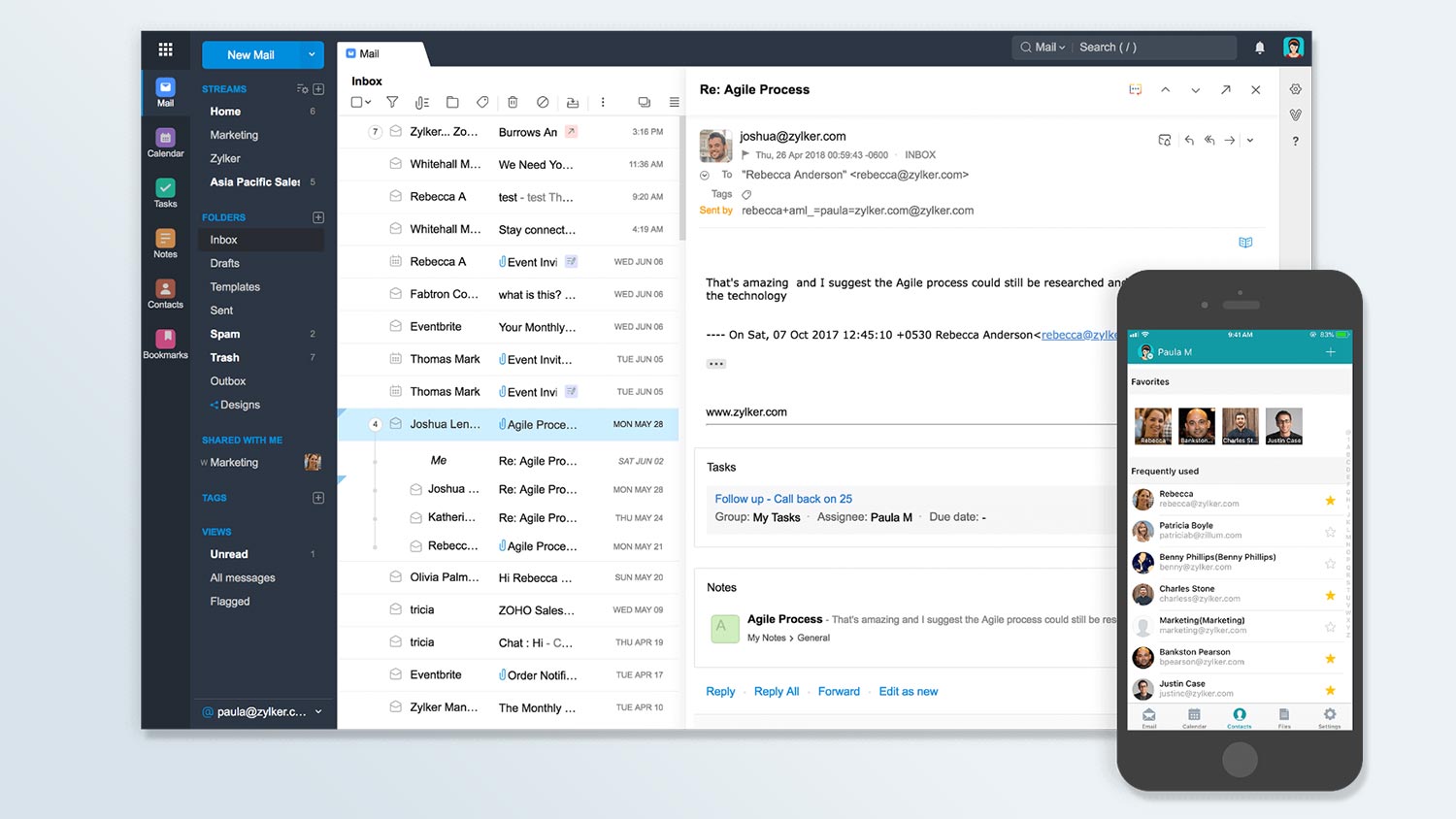
5. Zoho
Reasons to buy
Reasons to avoid
Zoho, a cloud-first productivity company, makes a slew of apps and services for consumers and enterprise users. So, it's perhaps no surprise that the company is competing heavily in email.
Zoho Mail comes with a colorful design that makes it easy to switch between your email and other apps, like your calendar, tasks and contacts. Better yet, it comes with the option to integrate all of your email accounts from other services, and if you want to use folders to boost your email productivity, rest assured that Zoho can get it done with ease.
This service is a great value because of the sheer number of features that you get in the free version. For most consumers, there would simply be no reason to upgrade to the paid version. And even for some companies that don't care about a vanity URL, opting for the base, free option makes some sense.
If you are a business user, however, you may want to look elsewhere. While Zoho puts plenty of apps at your disposal, its services are sometimes underpowered compared to some alternatives from Microsoft and others.
Pricing on the business side also leaves a bit to be desired. At $1 per user per month, Zoho Mail Lite is affordable, but it comes with only 5GB of storage per user and 25MB for email attachments per use. You can bump up to Zoho Mail Premium, which has 30GB of storage per user and 40MB for email attachments per user, but it would have been nice to get that in the Lite version.
Sign up to get the BEST of Tom's Guide direct to your inbox.
Get instant access to breaking news, the hottest reviews, great deals and helpful tips.
Don Reisinger is CEO and founder of D2 Tech Agency. A communications strategist, consultant, and copywriter, Don has also written for many leading technology and business publications including CNET, Fortune Magazine, The New York Times, Forbes, Computerworld, Digital Trends, TechCrunch and Slashgear. He has also written for Tom's Guide for many years, contributing hundreds of articles on everything from phones to games to streaming and smart home.
